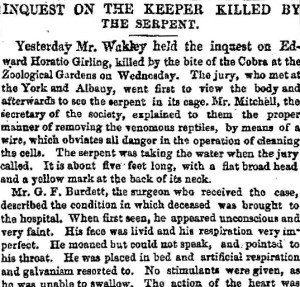After the bite, Girling was rushed to hospital by cab, a journey that took 20 minutes. While in the cab his head swelled to “an enormous size” and his face turned black. Once at hospital, Girling was given artificial respiration and electrical shocks. Neither was successful and he died 35 minutes after arrival.
It did not take long for the inquest to discover that Girling was responsible for his own demise. One of Girling’s work colleagues, Edward Stewart the hummingbird keeper, testified at the inquest. He claimed to be passing by the snake enclosure with a basket of larks when he saw Girling inside. Apparently showing off, Girling picked up the ‘Bocco’, a mildly venomous colubrid snake, by its neck. According to Stewart:
“…Girling then said ‘Now for the cobra!’ Deceased took the cobra out of the case and put it inside his waistcoat, it crawled round from the right side and came out at the left side… Girling drew it out and was holding the cobra between the head and middle of the body when it made a dart at his face.”
Stewart and other witnesses also testified that Girling was drinking ample quantities of gin at breakfast time. A zookeeper named Baker told the inquest “he believed that the deceased was intoxicated”. It was also noted that Girling had little if any experience with venomous snakes; he had only recently started working at the zoo after employment with the railways. Unsurprisingly the coroner found that Girling had died as a “result of his own rashness whilst in a state of intoxication”.
Source: The Daily News, London, October 23rd 1852. Content on this page is © Alpha History 2019-23. This content may not be republished without our express permission. For more information please refer to our Terms of Use or contact Alpha History.

